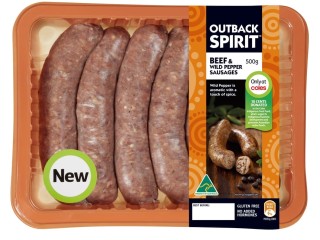 Coles Supermarkets sees a strong future for QR codes as part of a broad-based approach to meeting retail customer demand for more extensive and detailed food product information.
Coles Supermarkets sees a strong future for QR codes as part of a broad-based approach to meeting retail customer demand for more extensive and detailed food product information.
Responding to Beef Central’s earlier article on the emergence of QR-codes on value-added beef lines (see story “QR codes driving consumers down the information super-highway”) Coles’ meat business category manager, Chris Nicklin said customer interest in product information was growing on an almost weekly basis.
“The information they are seeking around the provenance of a product, ingredients, recipe ideas using the product and similar information is continuing to expand rapidly,” Mr Nicklin said.
“We see the QR code system as an ideal mechanism to deliver that, but it is in fact just one of a number of options. Some of the others include point-of-sale links back to a website, and even extended conventional barcodes which have the capacity to hold a little more information.”
In the case of the point-of-sale links, these could be delivered through in-store touch-screens, or simply using a barker-card in front of a certain steak line, to provide a reference back to a Coles website providing menu ideas, nutritional information, or source of origin for that item, for example.
“We will be taking a close interest in how the QR-coded Tibaldi/Cape Grim sausage and pre-cooked roast beef lines go down with customers. It’s just one of a myriad of ways that we are trying to get that depth of information back to the customer, because it can’t all be put on the label,” Mr Nicklin said.
Asked to provide a rough estimate of what percentage of perishable and dry goods grocery items in Coles’ aisles now carried a QR-code, he thought it might already be about four percent.
“It is beginning to be seen more regularly in retail and food service. I was in a coffee shop recently where they were using scanned QR codes as part of their loyalty program (buy five and get the sixth cup free) instead of using a punched loyalty card.”
Mr Nicklin said if the QR-code process worked on the Cape Grim product range, Coles obviously had the ability to ‘drop it onto’ a lot of different meat protein items in the chilled cabinet.
Asked whether Coles saw value in moving down the traceability/identity path as Tibaldi/Cape Grim had done, linking each QR-coded item back to a single or small group of cattle suppliers, he said more and more, provenance was coming through as a highly-rated feature among consumers.
“There is a natural hierarchy occurring. The first issue they want to determine is whether it is Australian in origin. Then it goes to state, then they want to know which region it comes from.”
“Obviously there are certain areas that consumers tend to associate with quality, including places like Tasmania, King Island and Margaret River. As soon as those names are mentioned it conjures up an image in the consumer’s mind’s eye.”
It appeared to be a natural progression that as consumers wanted to know more about the food products they were purchasing, the source of supply was an important part, Mr Nicklin said.
He pointed out that the Cape Grim sausage trial project was innovative in another way, in that it was the first time a prominent sausage maker and a successful private beef brand had come together in a partnership.
New value-added lines
 The gourmet sausage offer was part of a raft of new red meat products currently hitting Coles’ shelves.
The gourmet sausage offer was part of a raft of new red meat products currently hitting Coles’ shelves.
Another of these was a range of four value-added sausage items containing native ‘bush food’ ingredients. These include beef & wild pepper; beef & bush tomato; pork, Kakadu plum & lemon aspen; and lamb & wild lime pickle. These will be marketed under the collective name, Outback Spirit, in distinctive packaging.
The products are being produced out of the Farm Foods facility in Geelong, Victoria. Farm Foods recently received a $280,000 Geelong Investment and Innovation Grant towards a $650,000 upgrade of its processing and packaging lines.
The upgrade will increase Farm Foods’ manufacturing capacity, mostly value-added meat products such as sausages and minced meats. The expansion will create up to 18 new full-time jobs over the next 12 months.
Part of Coles parent company, Wesfarmers’ corporate policy is to support Indigenous business activity, and a percentage of proceeds from every pack sold from the Outback Spirit sausage range will go back to Indigenous communities in remote locations to expand and develop their native bush food programs.
Coles is also currently launching its 2011-12 ‘Grill’ range, aimed at summer barbecue season, including deboned, marinated and value-added items ready to go on the barbecue plate.
“As the weather improves, the plan is to provide a section in the chilled meat area for ‘aspirational barbecuers’ to come to the one spot to access a wide selection from new and reformulated lines,” Mr Nicklin said.
